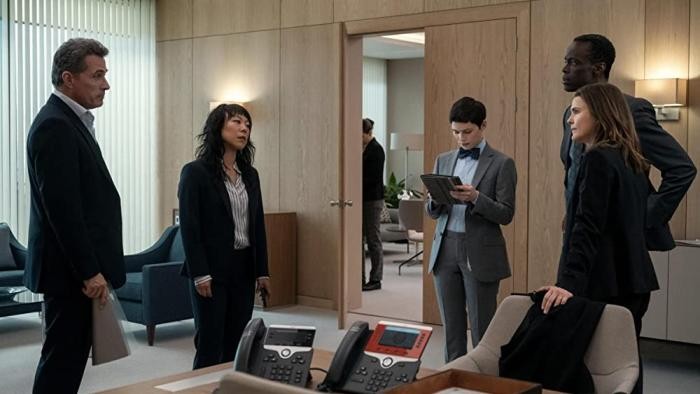Found at the center of the TV series The Diplomat, which took Netflix's top spot from Beef (an overrated show) is a wife and her husband. The wife, Kate Wyler, is played by Keri Russell; the husband, Hal Wyler, by Rufus Sewell. Both are American. Both are career diplomats. In the way the ideal servants of Plato's polis are the guardians, the Wylers are the State Department's ideal civil servants.
Those who are to be real [Eντως] guardians of the laws must truly [Eντως] understand the things concerning the truth of [all serious matters], and must be capable of interpreting it in speech and of following it in deed.
— Nokoo 🇻🇦 (@NokooTV) April 29, 2023
✍️ Plato pic.twitter.com/Lz0m5lEACB
For reasons that would take too long to explain (and there is no need to mention the rocky state of the Wyler's marriage), the US president William Rayburn (played by Michael McKean) sends the wife to the UK to be her country's ambassador. She's followed by her husband (Sewell, a Brit, has a flawless white American accent). The UK is not only in crisis (an unknown power attacked one of its aircraft carriers in the Persian Gulf), but is run by a clown, Nicol Trowbridge (Rory Kinnear). Trowbridge is clearly Boris Johnson; Rayburn, Biden.
That said, let's turn to the question that constitutes the entire purpose of this short (I promise) post: Why does this geopolitical drama capture so perfectly Seattle's present political moment?
Seattle is just a lot of hot air when it comes to the climate. https://t.co/N1WbZYi2Iw
— Charles Mudede (@mudede) April 28, 2023
What is The Diplomat really about? How diversity does not, in essence, present a real challenge to America's form of capitalism. Though the show's key figures are white, their work environment is not. The American ambassador's counterpart, the UK's foreign secretary, is Black (David Gyasi). Her top advisor at the embassy is Black (Ato Essandoh). And the woman the ambassador and her top advisor answer to, the White House chief of staff, is Black (Nana Mensah).
Quick note: these Black actors (two American, one, Gyasi, British), are second-generation Ghanaians. Indeed, Mensah got her start on the 2014 web series An African City, a Ghanaian Sex in the City.
The diversity does not stop with these three. The CIA station chief in London is Asian American (Ali Ahn), and the secretary of state is Latino (Miguel Sandoval). We must also include in this impressive mix Ronnie, a US embassy aide who in fiction and reality is trans (Jess Chanliau).
.@QueerKCL Thurs 23 July 18.30 @JessChanliau is a trans/non-binary, multi-disciplinary clown & political actor. In this session, they will be reflecting on their casting experiences and more. #BSL Book via @eventbrite @EquityLGBT https://t.co/01LchQsNGq pic.twitter.com/MkYTH4xsNN
— Martin Fox-Roberts (@martinsli) July 21, 2020
But what on earth is all of this diversity doing in this show? This is not hard to determine and describe. The diversity is only just that, diversity. There is no deep meaning to it because if you are white, Black, Asian, Latino, trans, you only have one very basic function: maintaining the power of the capitalist class. The state—run by Labor or Conservatives in the UK, or by Democrats or Republicans in the US—ultimately answers to this class, which is made all the more visible by its absence in The Diplomat.
But why all of this intrigue, secret meetings, acrobatic geopolitical analysis, and assassinations? What is a British aircraft carrier doing in the Persian Gulf in the first place? What do the Iranians really want from the West? Why is the West so hard on Iran? Why are the Russians always up to something shady? The answer will not be found in ordinary citizens; instead, those who control not only their economy but also their democratic institutions—the capitalists.
BREAKING: Harlan Crow and his family's average yearly political contributions went up 862% after Citizens United was decided in 2010.
— Americans For Tax Fairness (@4TaxFairness) May 1, 2023
Who provided a deciding vote for that case?
Justice Clarence Thomas, a "family friend" they showered with luxury travel and gifts for 20+ years. pic.twitter.com/GS2KCq6ktd
Let's turn to Seattle. This "progressive" city is in many respects a lot like The Diplomat—in fact, we can go as far as to say that it aspires to the condition of radical diversity we find in that TV show. And that's as far as our politics are permitted to go. Anything meaningful (meaning: fundamental) is so obviously out of the picture. This is why this city, filled with educated people who know that climate change is real, can still build a highway in its core. This is simply the state supporting the most inefficient (and therefore most lucrative) form of transportation. Despite our democratic institutions and progressiveness, our city is ultimately run by those who only have one function: securing the continuation of the power of those who command capital.




















